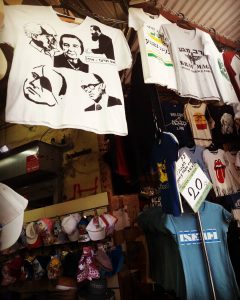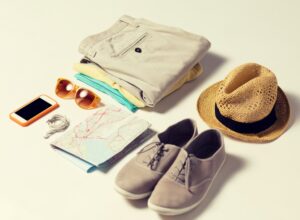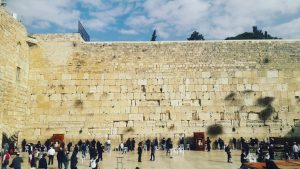Israel is a country where many cultures and religions coexist together, making it a culturally various country. Jews, Christians, Muslims, and other faiths live together in this small land, and each of these religious groups includes different sub-cultures. In Israel, you can find half-dressed people at the beaches of Tel Aviv and at the same time Hasidic Jews wearing formal black clothes and fully covered Muslim women in hijabs. Hence, there are tips about dressing in Israel on different seasons and places.

The dress code of modern Israeli society
In modern Israeli Society is more than welcome to wear t-shirts and jeans at gourmet restaurants, concerts and at work. Usually, Israeli men prefer to wear a button-up shirt on formal occasions, especially the older generation. Women typically wear elegant gowns at weddings. In everyday life, Israeli women usually wear a pretty dress or a blouse with jeans or a skirt.
How to dress in Israel in the summertime
Dressing In The Summertime is very simple. The summer in Israel starts around April until October. The typology of clothing must be light, short and comfortable. A light jacket and a short-sleeve shirt are suitable garments during the evenings in the desert, Jerusalem and the Golan Heights. Moreover, sometimes some places in Israel are intensively air-conditioned; hence it would be helpful in these cases to wear an extra garment such as a jacket. During July and August, the region around Tel Aviv and the city are scorching and humid; therefore, it is recommended to dress lightly. No need for an umbrella since between May and September it doesn’t rain.

Swim in the Israeli Mediterranean Sea
There are many beaches in Israel where it is enough to be dressed in a swimsuit for women and swimming trunks for men, while it is where religious beaches are-you should dress modestly, as the rules are long clothes that will cover most of the body but at the same time suitable for swimming.
The Mediterranean sea becomes warmer since June, and it maintains a warm temperature until late October, allowing you to enjoy a swim in the sea. Even during the winter, the Mediterranean Sea never become cold like the ocean. The other places where you can swim are the Sea Of Galilee and the Jordan River for an amusing experience. There are many beautiful bathing spaces in Israel, and some are supplied by hot springs, and in this way, you can enjoy a bath even in the wintertime.
The Jordan River has many spots where it is a pleasure to take a quick dip in the refreshing water. The Dead Sea includes many places to visit, and the experience usually includes a mandatory experience to float in the very salty water. Another fantastic experience is to swim and dive in the Red Sea; therefore, it would be better to stay in Eilat for two or even three days.
Tips on what to wear for hiking during the Israeli summertime
Hiking In Proper Clothes is essential because it is an activity that is usually well done during the wintertime. If you visit Israel in the summertime and go hiking, it is better to wear lightweight long-sleeve clothes protecting your skin with clothes and sunscreens. During the summer in Israel, it is better to avoid walking in the middle of the day and prefer a walk in the early mornings and evenings, which are the most chill hours. Sunscreen is fundamental, and it goes definitely in your luggage, preferably the total filter one, especially if you’re going hiking wearing a sleeveless shirt and a pair of shorts. And also don’t forget a hat and a pair of sunglasses. Indeed, it is essential to protect the skin against the sun during walks and hikes in Israel. Another important thing is to choose the right pair of shoes before hiking; the best choice is a good pair of sneakers.

Tips on what to wear for hiking during the wintertime
In The Wintertime, it rains in Israel, while in Jerusalem, Hermon and Safed almost every winter snows; therefore, it is recommended to bring with you warm clothes. The wintertime in Israel is pretty changeable because it is not stable weather every day. A t-shirt with a pullover or cardigan would be ideal, as well as a rainproof jacket and extra warm clothes.
The Golan Heights, Jerusalem, Tzfat, and the Upper Galilee are Israel’s coldest areas and cities, and in these regions of Israel, the snow is frequent in the wintertime. Indeed, Israel is usually associated with a scorching desert area, but in reality, there are many forests, natural parks and green regions besides mountains. The desert areas are featured by freezing nights in the winter, while the coastal districts have mild and humid weather. Additionally, it can snow in the desert, so it is essential to check the weather forecast if you visit the desert. The main tip about what to wear in Israel during wintertime is the same as for other countries in the world, i.e. layers of clothes to add or take off depending on the weather conditions.

Modest Dress Code in religious sites
Dressing Modestly In Religious Sites is essential when you visit a place such as a mosque, synagogue, church, and the Wailing Wall. It is strictly demanded to wear clothes that cover you up to the elbows and knees in most religious places. Hence, you will avoid shorts, miniskirts, and sleeveless shirts. It is recommended to bring a long-sleeve shirt and also a pashmina with you. These rules are for men and women in every religious place. Please respect their celebratory customs and dress up modestly if a ceremony occurs or during the common prayers. I recommend reading my post about Behaviour Tips At The Western Wall.

The traditional Jewish religious clothes are a buttoned-up shirt and long pants for men, and a long-sleeve and long dress/skirt for women. In some religious worship places, you might cover your head, so bring with your hat or wrap.
Visiting Orthodox Jewish Neighborhoods
There are many areas in Israel where Ultra-Orthodox Jewish communities live. The most renowned neighbourhoods are in the Me’ah She’arim area in Jerusalem and the city of Bnei Brak, close to Tel Aviv. Usually, even the local secular Jews stay away from these places or dress modestly if they visit these areas. To visit these districts is a unique and enjoyable experience, mainly if you take a guided tour and read about these religious groups. Please always keep in mind to dress modestly, wearing long sleeves and covering the knees.

Political slogans on clothing
Since the tense situation in Israel, it would be better to avoid wearing political slogans on your clothes. For example, it is highly forbidden to visit a Palestinian village with an openly Zionist message on the t-shirt. Also, it would be better to avoid wearing a Yarmulke or Tzitzit when visiting Arab villages.
Anyway, Israel is a very safe country to visit, but in any case, it’s always better to avoid disputes with the local inhabitants, and it is a sign of respect and politeness. Hence, as you just read, it is pretty simple to pack your suitcase when you plan a trip to visit Israel. Enjoy your stay in this beautiful country.


